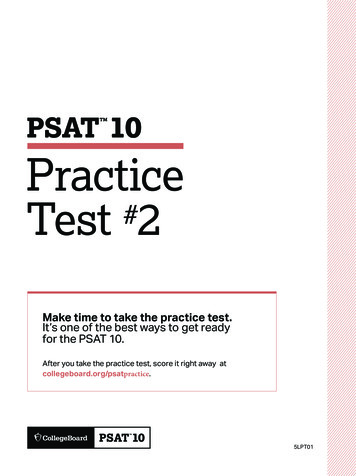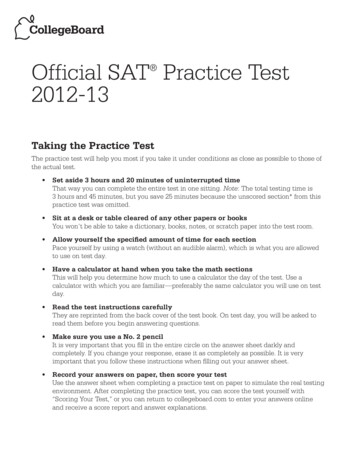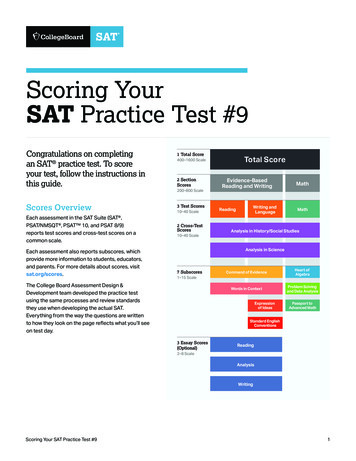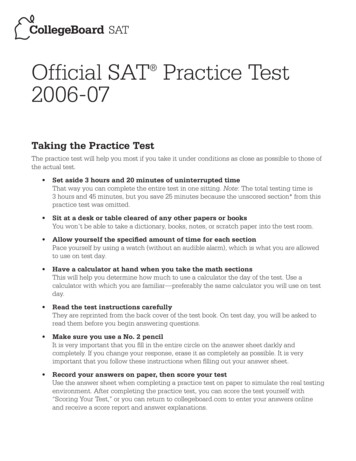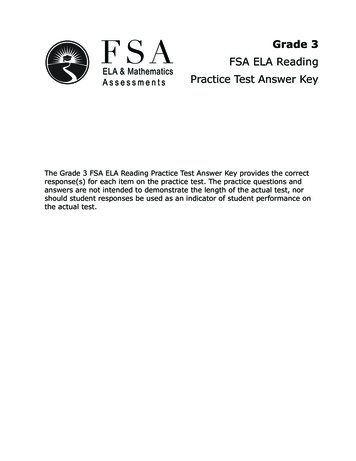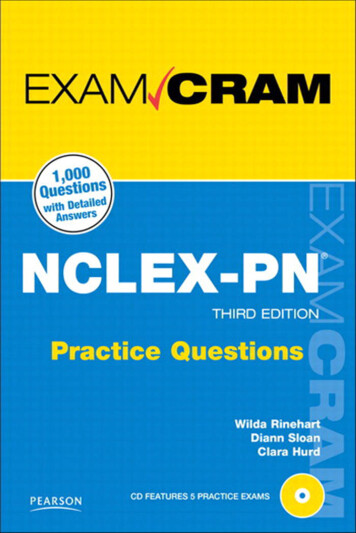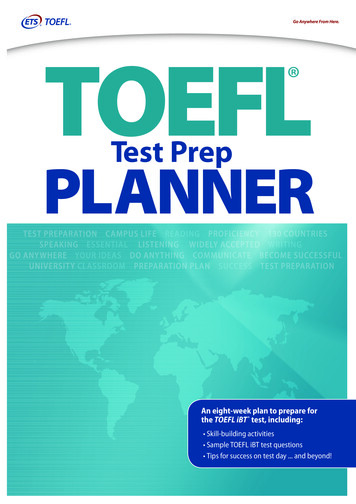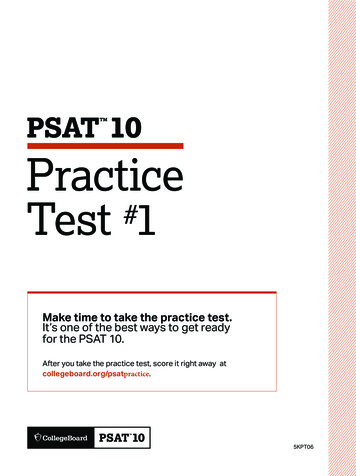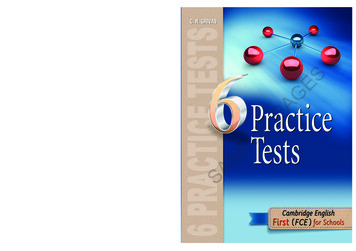
Transcription
Cover Practice Tests FCE St6/02/4005:56 ¶MPage 1C. N. Grivasñ Clear, concise presentation of the most important grammatical &structural phenomena tested at this level. Each grammar section isESGKey features of the book are:PAFOR THE CAMBRIDGE ENGLISH FIRST (FCE) FOR SCHOOLS6 PRACTICE TESTS6 PRACTICE TESTSfollowed by transformations. This will help candidates consolidatethe knowledge of grammar and structure they have gained duringand format of the examination.ñ Further practice in Key Word Transformation focused ongrammar / structure, vocabulary and collocation or idiomaticexpression.ñ Further practice in Word Formation.Components: Student’s BookISBN 13: 978-960-409-819-4 Teacher’s Book CDsMñ These six complete practice tests accurately reflect the content, levelSAthe Reading & Use of English section of the examination.Cambridge English First (FCE) for Schoolsconfident in their use of the language, and more able to cope withPLEprevious years of study. As a result, candidates will feel more
CONTENTSIntroduction . . . . . . . . . . . . . . . . . . . . . . . . . . . . . . . . . . . . . . . . . . . . . . . . . . . . . . . . . . . . . . . . . . . . . . . . . . . . . . . . . . . . . . . . . . . . . . . . . . . . . . . . . . . . . . . . . 4Grammar in Brief – Grammar-based Key Word Transformation . . . . . . . . . . . . . . . . . . . . . . . . . . . . . . . . . 7.252TEST 2.41TEST 3.57TEST 4.73TEST 5.TEST 6.89105MPLEPAGESTEST 1Further Practicetice in Key WWord TransformationSAfocused on:: grammar / structure,structvocabulary and collocation or idiomatic expression . . . . . . . 122Furtherurther PracticePractin Word Formation . . . . . . . . . . . . . . . . . . . . . . . . . . . . . . . . . . . . . . . . . . . . . . . . . . . . . . . . . . . . . . 137Glossary . . . . . . . . . . . . . . . . . . . . . . . . . . . . . . . . . . . . . . . . . . . . . . . . . . . . . . . . . . . . . . . . . . . . . . . . . . . . . . . . . . . . . . . . . . . . . . . . . . . . . . . . . . . . . . . . . . . . . 147Sample Answer Sheet . . . . . . . . . . . . . . . . . . . . . . . . . . . . . . . . . . . . . . . . . . . . . . . . . . . . . . . . . . . . . . . . . . . . . . . . . . . . . . . . . . . . . . . . . . 159Listening Scripts . . . . . . . . . . . . . . . . . . . . . . . . . . . . . . . . . . . . . . . . . . . . . . . . . . . . . . . . . . . . . . . . . . . . . . . . . . . . . . . . . . . . . . . . . . . . . . . . . . . . . 165
GRAMMAR IN BRIEF1 PRESENT TENSESA Simple PresentMy parents work for a big company.NOTE ALSO:Here comes Steve!There she goes!Then he opens the door and walks out of the room.Robert Pattinson plays the role of an FBI agent.PLANE CRASHES IN INDIAC Simple Present PerfectHave you seen any James Bond films?NOTE ALSO:I’ve sent him three e-mails this week.This / It is the first / second / only time I’ve witnessedan accident.This / It is the best / most delicious pie I’ve ever eaten.How long has it been (OR: is it) since you have moved(OR: moved) here?It has been (OR: is) years since it has snowed(OR: snowed) here.B Present ContinuousBe quiet! The baby is sleeping right now.NOTE ALSO: have gone to / have been to / have been inDad’s working overtime every day this month.Our neighbours have goneone to Austria for Christmas.Those boys are always / forever / constantly / continuallyI have been to Portugalgal many times.causing problems.Sally has been in Italyy for two weeweeks.His condition is improving as the days go by.D Present Perfectect ContinuousThe boat is leaving / leaves tomorrow at 9 o’clock.He has been working here for six months / since June.NOTE ALSO: Whyy are your eyes rered? Have you been crying? Why are you smelling the cheese? Is something Who has been uusing my shampoo? The bottle iswrong with it? ( checking its smell)empty. Are you seeing Janet tonight? ( meeting) I have knoknown him for years. I’m thinking about joining a gym. ( considering)[NOT: I hhave been knowing / know him .]TheyThe have had this car since 2002. You’re being silly now. ( behaving in a silly way[NNOT: They have been having / have this .]at a particular moment)meEComplete each sentence with two to five words,ords,ds, including the word given.The last time I went to Crete was in Julyuly 2010.BEENI .Crete since July 2010.9The last time we went dancing was months ago.FORWe .months.2I haven’t had a reply to my email yet.10STILLI am .a reply to myy email.They have never swum in a pool before.TIMEIt’s the .in a pool.3Robert began to writee poetry five yearsyeago.11WRITING Robert .fivee years.rs.Look, the teacher is coming, boys!HERELook, . ,boys!4The groupup broke up threetyears ago.12SINCEIt .the group bbroke up.Derek met Susan eight months ago.HASDerek .eight months.5It’s more thanan a month since I saw Peter.13FORI .more than a month.He has got a job at a café this summer.ISHe .at a café this summer.6This is the worst film I’ve ever watched.14NEVERI .bad film.7His involvement in politics started when he was atuniversity.15INVOLVED He has .he was at university.Why do you complain about the weather all thetime?FOREVER Why .about the weather?8SAMPL1I haven’t spoken French for ages.SINCEIt’s ages .French.16We bought this sofa six years ago.HAVEWe .six years.This is the best song I’ve ever heard.BETTERI .this.3
2 PAST TENSESA Simple PastC Simple Past PerfectHe went out every night when he was younger.OR: He used to go out / He would go out .They had served breakfast by eight o’clock / by thetime we woke up.NOTE ALSO:NOTE ALSO:That / It was the first / second / only time I had swumin a pool.That / It was the dullest / most boring play I had everseen. How long ago was it that they moved here?How long is it (OR: has it been) since you (last) spoketo Chris?It is (OR: has been) months since we had (OR: havehad) a holiday.He didn’t read the letter until everyone (had) left.After they (had) had dinner, they ordered dessert.As soon as he (had) heard the news, he called his wife.We set off before he had given / gave us the map. B Past Continuous What were you doing at the time of the robbery?I was having a shower when the lights went out.He was listening to the news while he was drivingto work.D Past Perfect ContinuoussHe had been studying French for eight yeyears before hegot his certificate.NOTE ALSO:My sister was always / forever / constantly / continuallyborrowing my clothes.NOTE ALSO:By 2005, he hadd been playing ffor the school team forfive years.She had backache becausbecause she had been plantingflowerswers all morning.PA Complete each sentence with two to five words, including thehe word given.I had to tidy my room before going out.UNTILI couldn’t go out .myroom.2I haven’t spoken to Adam since we graduated.uated.dLASTThe .aduated.to Adam was when we graduated.3Mr Swift did not stop workingg until he was seventy.seveWHENMr Swift .working.PLM9Lauren haLaurehad never ridden a motorcycle before.FIRSTTIt was the .a motorcycle.10Pete painted the walls and Kelly cleaned thecupboards.WHILEPete was painting the walls . the cupboards.11No other student had ever talked back to her.ONLYHe was the .talked back to her.12When I eventually stopped, I’d been a smoker fortwelve years.SMOKING By the time I stopped, I . twelve years.13When I lived on the farm, I woke up at five everyday.WOULD When I lived on the farm, . at five every day.5She started cookingooking as soon as they arrived.UNTILShe .they had arrived.6She has been working here for two years.STARTED She .ago.14When did you have a haircut?SINCEHow long .a haircut?They argued all the time when they were little.FOREVER They .when they were little.15I had never watched a better game.BESTIt was the .watched.784Debbie went to Mykonosykonosnos every summersummsumwhen shewas younger.USEDDebbiebie .Mykonos every sumsummer when she wasyounger.ounger.SA4E1The thieves left before the police got here.BYThe thieves .the police got here.
Practice Test 1READING & USE OF ENGLISHPART 1For questions 1-8, read the text below and decide which answer (A, B, C or D) best fits each gap. There is an exampleat the beginning (0).Example:00A put offA B died offBC C passed byD passed awayD INDIAN SUMMERCaptain Majendie had bought the villa in India on his honeymoon, whenwh he was inthe British army there, and when he (0) . , his widow went out to India to (1) .some time there. Stuart had known Majendiee for years, so heh felt he should write tothe widow and offer his sympathy (2) . he had nevernmet her. Back in England,Stuart received a letter from her, inn whichwshe expressedprea desire to meet him. 'Ishall be leaving India at the (3) . of JunJune,' she wrote, 'and I have a lot of businesswer his closest friend, so I (4) . you canto attend to. Howard always told me you werehelp me with all the official (5(5) . that needs attention. I shall be in Italy for thesummer; if you do not alreadyalread (6) . plans, I would be pleased if you could join methere.' Stuart feltelt obliged to (7) . his plans for a trip to Ireland and three weeksd himself in a boatboa crossing Lake Como, in northern Italy, (8) . for Mrslater foundMajendie'sndie's house.1A ppassB spendC stayD waste2A even thoughB despiteC as ifD in spite3A finishB endingC lastD end4A hopeB desireC demandD wish5A certificateB papersC paperworkD paper6A makeB haveC setD organise7A cancelB cutC stopD break8A headingB directingC movingD going5
Practice Test 1Reading & Use of English - Parts 2 & 3PART 2For questions 9-16, read the text below and think of the word which best fits each gap. Use only one word in each gap.There is an example at the beginning (0).Write your answers IN CAPITAL LETTERS.Example:0T H E MGROWING PAINSwi the problemThe teenage years are often a challenging and difficult time for parents, presenting (0) . withof how to maintain their children's respect and obedience, but at the (9) . time, allow their independenceto increase. It's quite normal (10) . children to be disobedient in some way, as they too probablyfind it anpawkward and confusing time. Generally, it's best to treat defiance calmly, unless it's causing seriousseriou disruption at homeor school.Two things that parents should try to avoid doing (11) . their teenagers are,a firstly, to become much(12) . strict, and secondly, to try to be 'one of the kids'. Both these things (13) . only createbigger divisions and differences.The key lies (14) . keeping up good levels of communicationcommunicatio on both sides. Parents need to learnrove of something,someth(15) . to let their teenager know when they disapprove(16) . being so critical ornegative that their child feels ignored or pushed away.PART 3w. Use the word given in capitals at the end of some of the lines to formFor questions 17-24, read the text below.a word that fits in the gap in the same line. There is an eexample at the beginning (0).Example:0AMETTERS.Write your answers IN CAPITAL LETTERS.O RIGIN ALKNOWLEDGE FOR ALLiof a grammar school in England was to offer children preparation for aThe (0) . ideacareer at universityrsity or forfo a job where Latin was a (17) . . To be a lawyer's clerk, forREQUIREexample, a person (18) . needed this subject. Although most grammar schools have beenTRADITIONreplaced by comprehensive schools, the (19) . of which was seen in England in the 1960s,INTRODUCEthere are still some grammar schools (20) . .REMAINThe whole concept of a comprehensive (21) . is one which many people have some6ORIGINEDUCATE(22) . to. Such a system is intended to take in all the children of the appropriate age, whoOBJECTlive within the district, (23) . of academic standard. Therefore, in theory, all children areREGARDgiven the same opportunity to be (24) . .SUCCEED
Reading & Use of English - Part 4Practice Test 1PART 4For questions 25-30, complete the second sentence so that it has a similar meaning to the first sentence, using theword given. Do not change the word given. You must use between two and five words, including the word given.Here is an example (0).Example:If he didn’t have a computer, he wouldn’t be able to manage.0DOHe could . his computer.The gap can be filled by the words ‘not do without’, so you write:Example:0NOT DO WITHOUTWrite only the missing words IN CAPITAL LETTERS.25 I thought the weather would be colder than this.COLDIt’s not .it would be.26 ‘Don’t ever do that again!’ she said to her brother.broWARNEDShe .do that again.27 She cooked more food than was necessary for the party.SOShe needn’t .for the party.28 I’m sure Chriss didn’t mean to hurt your feelings.INTENTIONI’m sure Chriss .your feelings.29 Althoughough she was rich, she was very down to earth.SPITEIn . rich, she was very down to earth.30 People say she cannot keep a secret.UNABLEShe is . keep a secret.7
Practice Test 1Reading & Use of English - Part 5PART 5You are going to read an extract from a novel. For questions 31-36, choose the answer (A, B, C or D) which you thinkfits best according to the text.A MATTER OF LIFE AND DEATHESNeil Sanders was a prisoner. He had committed a crime while on duty as a soldier and was beingtaken to prison by an officer, Captain Bilham. As it happened, they were both from Scotland.orn in Glasgow.GlasHowever, Neil came from the Highlands, while Captain Bilham had been bornwNevertheless, they had agreed to forget their differences as the train journey was long and it wouldbe easier for them both if they didn't argue.PAGhey played game after game –What really helped them get on well was Neil's pocket chess set. Theyme level. CaptainCapta Bilham couldprobably over a hundred in all – and they were both about the samemes in the history of chess. He had aremember openings and endings from some of the great gameswonderful memory and liked teaching; he said that was what made him such a good officer.ds. They were ono a train crossing Egypt, whereThey started talking together, almost becoming friends.ld War II. WhenWhe they got to Cairo they wouldthe British army was stationed at that period of Worldbein sent there on a special mission, butnever see each other again. Bilham told Neil that he wass beingould be put in prison.ihe wouldn't go into details about it. Neil wouldHe might even be hanged.MPLEAs they talked, Captain Bilham started to feel that Neil wasn't a bad person at all – that although Neilshoulhad shot and killed a British armyy officer he shouldn'treally be a prisoner. But the circumstancesha tried to force his men into a situation where theywere unusual. The officer had been stupid: he hadfficer, it seemed, had gone mad. He had even pulled out his gun andwould all be killed. The officer,rthreatened to shoot his own men if they refusedto approach the enemy. Neil, a sergeant, had seencer was goinggoi to get them all killed. There had been a battle going on; gunsvery clearly that the officerNe had shot the officer, saving the lives of the twenty men in hishad been firing all round them. Neilaps sacrificing his own.company but perhapsSAd probably be hangedhaHe wouldfor this crime. The court might give him twenty years in prison, butain Bilham doubteddoCaptainit. This was wartime, and even though Neil's superior officer had been aplete fool, he hadh still been an officer.completeCSuddenly, CaptainBilham felt ill. His face turned white and he started sweating. His hand went tohis chest. Neil wondered if he might have heart problems. Captain Bilham asked him to get somewhite tablets out of his bag, and Neil jumped up to do so. But when he turned round with the smallbottle in his hand, he saw that Captain Bilham had stopped breathing. He was half lying on his seat,his eyes still open – but he was obviously dead. Neil's first reaction was to feel sorry for him.Then he began to feel afraid. They would think he had done it!8
Practice Test 1Reading & Use of English - Part 531 Captain BilhamA liked explaining things.B used to be a teacher.C cheated when he played chess by remembering old games.D won most of the chess games they played.32 Neil had shot an officerA who had been behaving irresponsibly.B because he hadn’t wanted to fight.C because the officer had shot at him.D because he had wanted to be an officer himself.33 In what way had Neil perhaps sacrificed his own life?A He had risked being shot by the officer.B The other men might have shot him.C He could have been killed in the fighting.D He might now be executed.34 Why did Captain Bilham's hand go to his chest?A to find his tabletsB because he felt hotC to unbutton his jacketD because he felt a pain there35 How did Neil immediately feelel when he realised that Captain Bilham was dead?A hopeful that he mightt escapeB pity for himC worried thathat he would be blamedD relieved thathat he was dedead36 At the end of the extract,extract what did Neil think people would assume?A thatat he had killedkthe CaptainB that the CaCaptain had died of a heart attackC that Neil had stolen the tabletsD that Neil was afraid9
Practice Test 1Reading & Use of English - Part 6PART 6You are going to read an article about education. Six sentences have been removed from the article. Choose fromthe sentences A-G the one which fits each gap (37-42). There is one extra sentence which you do not need to use.A LESSON IN EDUCATIONYou could say that the modern education system in Britain is based on equality. All boys and girls,whether they are wealthy or not, are entitled to an education. However, it was not always like this.37In the early Middle Ages, education was mainly the responsibility of the church. It was,therefore, only boys intending to become priests or monks who benefited from formalmal learning.leaESeach Latin grammargramGrammar schools followed in the 12th century. First opened by the church to teachto boys, by the 16th century such schools also taught the languages and literature of the ancientanGreeks and Romans. However, they were no longer run solely by the clergy,andlergy, but by merchantmetrade associations as well. 38GoIn fact, before the late 1800s, girlss had little or no opportunityatall to receive a formal education.PAwealtThe poorer classes were also discriminated against. While thee sons of wealthierfamilies attendedhome This problem was firstexclusive ‘public schools’, the majority of the poor stayed at home.arity schools’ whichwhaddressed in the 1700s with the introduction of ‘charityprovided free teaching andclothing for the children of the poor. 39A type of modern-day‘monitor’ can still be found inmodble for teaching lessons, these monitors,some British schools today. Although they are not responsibleteach them the rules of the school.Emmonly called,caor ‘prefects’ as they are now more commonlyhelp to discipline the younger students andMPLIn 1870, elementary education was introduced by William Forster. ‘Elementary’ means basic, and theaim was to teach students thehe basics of reading,readin writing and arithmetic, or the three ‘Rs’ as they wereknown. Unlike charity schools,chools, whichwhi were located mainly in towns and cities, primary schools werebuilt throughout thee country so thattha more children could receive an elementary education. Manychildren, however,, were still unableunato go to these schools; since their families were so poor, theyhad to work instead. 40All children, male and female, whether wealthy or not, had to attendSAprimaryy school until the aage of eleven.In 1918,918, a new law was introduced to raise the school-leaving age. It meant that any student whofailed too be acceptedacceinto grammar school would still be entitled to a free education up until the ageof fourteen. 41Students now had to go to school until they were at least fifteen years old, andnew ‘secondary schools’ were developed. At the age of eleven all children would be made to take anexamination. The successful candidates would immediately begin grammar school, while the lesssuccessful students would attend the new secondary schools. 42Nowadays, most grammar and secondary schools have been replaced by comprehensive schools.Comprehensive schools welcome students of all abilities, so there is no longer any need foreleven-year-olds to take a special test. Although grammar schools still exist in some places,comprehensive education, which is generally considered to be the fairest system, offers a highstandard of education to all.10
Practice Test 1Reading & Use of English - Part 6A Although many people were against it, this system continuedfor almost thirty years.B Free education was introduced only at the beginning of theES20th century.C Although the majority of British schools continue to bem tostate-run, the government is actively encouraging thembecome more independent and to take greater control ofGtheir own affairs.PAD It wasn’t until almost four hundred years laterater that grammargrammschools opened their doors to femalele students.ELess than thirty years later, thee educationedupolicy waschanged again.For this reason, ten years later, elementaryeeducation wasEFAMPLsormade compulsory.G It was inn these schools thattolder students learned from thehers and thenth passed their knowledge on to the youngerteachersents.students.11
Practice Test 1Reading & Use of English - Part 7PART 7You are going to read an article about how people of other nationalities see the English lifestyle. For questions43-52, choose from the people (A-D). The people may be chosen more than once.Which of the peoplefeels that the political system in their own country should be different?12Ghad thought English people were all fair-minded?44455believes there have been some positive changes?doesn’t like the traditional English drink?ES43thinks the English are polite?46647thinks the English make polite conversation about trivial things?48arrived in England more than thirty years ago?49likes to play a particular sport?50nicknam for the English?says that people in their own countryy have a nickname51says their fellow countrymen are better at a paparticular sport?52
Practice Test 1Reading & Use of English - Part 7ARE THE ENGLISH LOSING THEIR ENGLISHNESS?C Tanako Ozawa (Tokyo, Japan)‘Back home in Hungary we have seasons. Winter isfreezing cold, summer is hot and dry, and inbetween come spring and autumn. It’s all verysimple and not much to talk about. Here in England,however, where the weather is just dull and grey allyear round – with possibly one sunny week in July,if you’re lucky – everyone is obsessed by thesubject. All conversations seem to start with areference to the kind of weather we’re having, havehad, or are going to have. ‘Turned out nice again,hasn’t it?’ ‘It looks like the rain might hold off.’ ‘It’sa nice day for it.’ Whatever the ‘it’ refers to. And onit goes. At bus stops, complete strangers, whowouldn’t ordinarily give you the time of day,suddenly open up and want to become your lifelongfriends if you mention the ‘w’-word. I don’t think I’llever get used to it.’‘We Japanese are, by nature, reserved and polite –probably too polite sometimes. At school, Iremember learning about England and about howpolite and considerate the English were. So when Ifinally came here to work, I was really lookingforward to playing a round or two ofo golf with myEnglish colleagues. Once, when I was at a golf clubands, I was very shockedssomewhere in the Midlands,toas had been installed.instafind that video camerasThe clubchairman explainedned that this had beenbe done to stopplayers cheatingg and claiming a hole-in-one. ‘It’s justanot cricket!’ he said. ‘If we allowedthis to go on, ourould get a bad reputationreclub wouldand people wouldop coming.’ It was then that I realised it was wrongstopto have these stereotyped images of people.’M‘There used to be a time when everything stoppedstoppefor ‘elevenses’ and afternoon tea. I rememberwhenremeI first arrived in London,, back in the 70s, the entireLondon Underground was on strike: the workerswere demanding time for a tea break!In fact, thebrwhole country seemedmed to run according to a teatimetable. If this happenedhappen in other countries, therewould probablyobably be a revolution.reAnd then when Idecided to tryy a ‘cuppa’,‘cupas the Brits affectionatelycall it, I was horrified. It came in a plastic cup, waslukewarm, sickly sweet and had milk in it! I almostthrew up. Nowadays, some of my English friendsactually admit to preferring coffee and, believe it ornot, you can even get a decent cup of espresso herein London! How times have changed!’SAGPAEPLB Ted Schuman (Washington DC,, USA)ESA Laszlo Zabor (Budapest, Hungary)D Rod Standish (Melbourne, Australia)‘There’s always been a healthy rivalry between usand the English – or ‘poms’ as we call them. Weusually thrash England at cricket, which is alwayscause for great celebration amongst the ‘Aussies’living over here. What we Australians can’t standabout the English is their superior attitude and theirRoyal Family. Most English people still think we’reall criminals or ex-convicts. As for the Queen, shemight be head of their country – although I neverunderstood precisely what job she does – but shecertainly shouldn’t be the head of ours. If Australiawere an independent republic, life would be muchbetter for us.’13
Practice Test 1Writing - Parts 1 & 2WRITINGPART 1You must answer this question. Write your answer in 140-190 words in an appropriate style.1 In your English class, you have been talking about the benefits of travelling abroad. Now your English teacher hasasked you to write an essay for homework.Write your essay using all the notes and giving reasons for your point of view.Is it better to have a holiday abroad or in your own country?NotesESabout:which is cheaperwhich is more educational. (your own idea)GWrite123PART 2Write an answer to one of the questions 2-5 in this part. Write your140-190 words in an appropriate style.ur answer in 140-Pazine.2 You have seen this announcement in an international magazine.Write your article.EMY FAVOURITE PASTIMEASTIMTell us about your favourite pastime and sayy whyw you think it is important for people to have an interest.We will publish the most interesting articles next month.3 This is part of a letter you received fromrom you
How long has it been (OR: is it) since you have moved (OR: moved) here? It has been (OR: is) years since it has snowed (OR: snowed) here. have gone to / have been to / have been in Our neighbours have gone to Austria for Christmas. I have been to Portugal many times. Sally has been in Italy for two weeks. D Present Perfect Continuous
